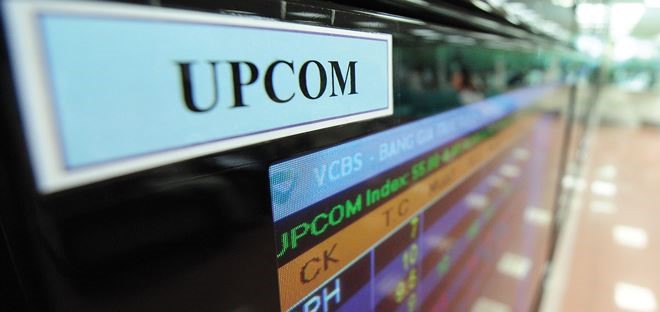The Unlisted Public Company Market (UPCoM) has gained less attention compared to the Ho Chi Minh and Ha Noi stock exchanges in the last few months, but there are some names expected to boost investor confidence.

The Unlisted Public Company Market (UPCoM) has gained less attention compared to the Ho Chi Minh and Ha Noi stock exchanges in the past few months, but there are some names expected to boost investor confidence.
There are now 803 companies trading their shares on UPCoM, which is monitored by the Ha Noi Stock Exchange. Eighteen of the total UPCoM companies are valued at more than VND10 trillion (US$439 million), accounting for 78 per cent of the market’s total.
But trading liquidity on UPCoM in the past two and a half months has remained modest compared to the two other exchanges.
Trading volume on UPCoM has not exceeded 25 million shares each day since October 11. In the same period, trading value topped VND676.7 billion on November 27 and the market’s UPCOM Index has moved sideways between 51 points and 54 points.
Though there are industry-leading companies trading their shares on UPCoM, what concerns investors is the limited transparency of information disclosure and prohibited margin lending for UPCoM stocks. Those elements discouraged investors from considering UPCoM a potential market besides the two main exchanges.
In fact, there have been some scams that justify investors’ concerns. The case of the Central Mining and Mineral Import Export JSC, with ticket MTM on UPCoM, in 2016 was a warning.
The company started trading its 31 million shares on UPCoM in April 2016 but the violations had taken place before the preparation of trading portfolio. When the fraud was reported to the police and market regulators two months later, MTM shares were immediately suspended.
In that case, former leaders of the company took advantage of loopholes in regard to the market regulation of information disclosure to manipulate the company share price and make fraudulent trading.
By doing so, the business leaders deceived shareholders to gain profits from fraudulent transactions, resulting in a VND56 billion loss for the whole market, including VND53 billion for shareholders.
The case was brought to court in mid November but the trial has been adjourned to a later date.
Outstanding names
Since the case of MTM, market regulators have strove to improve the trading quality of the unlisted public market such as putting post-IPO State-owned enterprises (SOEs) on the market to make it more attractive to investors.
Putting SOEs on the UPCoM is also a way to prepare those companies for listing on the two stock exchanges and meeting higher requirements of investors in the future, and to make those firms’ shares more attractive so it would be easier for the State to withdraw capital from their business.
Among those firms are PetroVietnam Power Corporation (PV Power), Binh Son Refinery and Chemicals Corporation (BSR), the flag carrier Vietnam Airlines, PetroVietnam Oil Corporation (PV Oil).
These are large-cap companies, leading in their own industries with good corporate governance, financial strength and monitoring system.
The initial public offering (IPO) of PV Power, PV Oil and BSR in January this year helped the State earn more than VND16.4 trillion from selling parts of its shares in those companies.
Those SOEs have great growth potential ahead, according to KIS Vietnam Securities and Viet Capital Securities.
For PV Power, KIS Vietnam Securities forecast its 2019 earnings would be much higher than 2018 because demand for thermal power would increase while that for hydropower would fall, thus pushing the electricity price in Viet Nam.
PV Power is also the second-largest thermal power producer in Viet Nam with a 9.6 per cent market share.
BSR, on the other hand, often receives incentive policies on land lease and tax from the Government regarding its important role in the country’s energy security.
The company earned VND103.9 trillion in revenue and VND4.9 trillion in post tax profit in the first 11 months, beating its full-year forecast by 33 per cent and 50 per cent, respectively. — VNS





